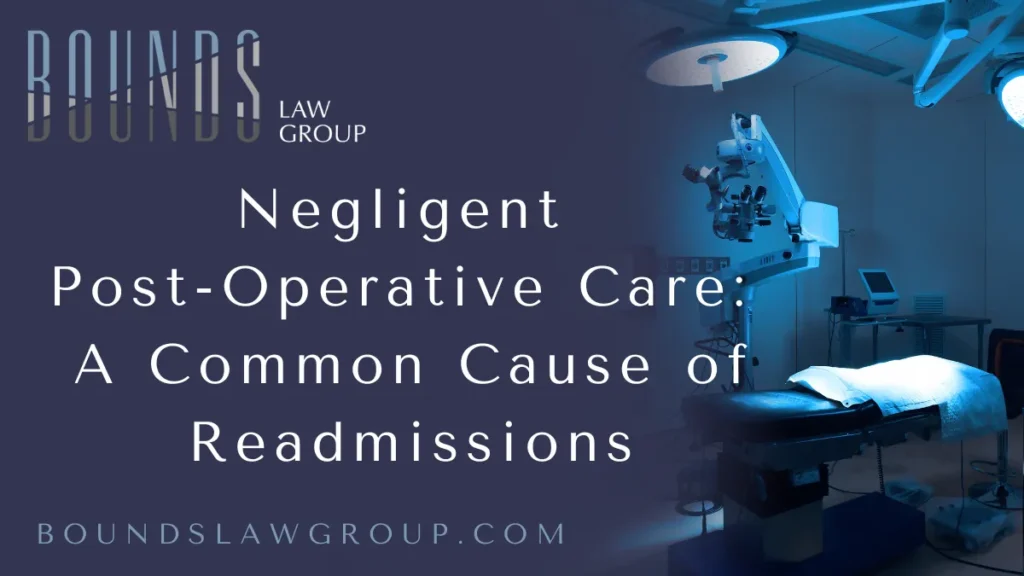
Post-operative care malpractice is an increasingly common and deeply concerning issue in modern healthcare. At Bounds Law Group, we have seen firsthand how improper medical attention following surgery can lead to unnecessary suffering, avoidable complications, and costly hospital readmissions. When post-operative care falls below the standard of care owed to patients, it becomes a dangerous form of medical malpractice that demands accountability.
In this article, we examine the critical elements of post-operative care malpractice, how it leads to hospital readmissions, and what legal recourse victims may pursue.
Contact us now at 877-644-5122 or complete the free case evaluation form for expert legal assistance.
What Is Post-Operative Care Malpractice?
Post-operative care malpractice refers to any negligent action or inaction by healthcare providers in the period after surgery that results in patient harm. This includes failing to monitor vital signs, improperly managing pain, overlooking infections, or neglecting to provide adequate discharge instructions. The period following surgery is highly vulnerable—patients rely on medical staff to detect complications early and intervene appropriately.
Negligence during this stage may include:
- Failure to identify post-surgical infections
- Inadequate wound care or follow-up
- Omission of prescribed medications or dosages
- Lack of clear discharge protocols
- Failure to monitor for internal bleeding or organ dysfunction
When a provider breaches the duty of care and this directly leads to injury, illness, or readmission, the legal claim becomes one of post-operative care malpractice.

The Impact of Negligent Post-Operative Care on Readmissions
Hospital readmissions are often a direct consequence of inadequate post-operative care. A patient who receives proper care should, in most cases, recover smoothly at home or through a monitored outpatient process. However, negligent care can quickly spiral into dangerous health crises.
Common complications leading to readmission include:
- Surgical site infections (SSIs)
- Pulmonary embolisms
- Internal bleeding
- Dehydration or electrolyte imbalances
- Medication errors
Each of these complications could be prevented or managed with proper monitoring and timely intervention. Unfortunately, failure to follow accepted post-operative protocols can mean these issues are missed entirely until they become life-threatening.
Common Examples of Post-Operative Care Malpractice
At Bounds Law Group, we have handled numerous cases of post-operative care malpractice, each highlighting the devastating impact negligent care can have on a patient’s recovery.
Here are some real-world scenarios:
- A patient discharged too early without checking vital signs later developed a high-grade fever and was readmitted with sepsis.
- A nurse who failed to report signs of infection resulted in delayed antibiotic treatment, leading to an extended hospital stay and permanent injury.
- Failure to administer prescribed anticoagulants after surgery led to the formation of blood clots and a subsequent stroke.
These situations are not isolated. They reflect a systemic failure to uphold the duty of care owed to every surgical patient.
Who Can Be Held Liable in a Post-Operative Care Malpractice Case?
Liability in post-operative care malpractice cases may extend beyond the attending physician. Several parties could be legally responsible:
- Surgeons who fail to order necessary follow-up care
- Nurses who ignore or downplay post-operative complications
- Hospitals that do not maintain adequate staff or protocols
- Pharmacists who fill incorrect medication orders
Proving liability requires demonstrating that the standard of care was not met and that this failure directly resulted in the patient’s harm. This is why it is critical to work with an experienced legal team like Bounds Law Group to gather medical records, expert opinions, and evidence of negligence.
How to Prove Post-Operative Care Malpractice
To succeed in a post-operative care malpractice claim, four elements must be proven:
- Duty: A doctor-patient relationship existed, establishing a duty of care.
- Breach: The provider failed to meet the standard of care expected in the profession.
- Causation: This breach directly caused injury or harm.
- Damages: The patient suffered actual harm—medical bills, lost wages, pain, and suffering.
Each of these elements must be supported by substantial evidence. Medical expert testimony often plays a pivotal role in explaining how the provider’s conduct deviated from accepted medical practices.
Legal Remedies Available for Victims of Post-Operative Care Malpractice
Victims of post-operative care malpractice may be entitled to significant compensation, which can include:
- Medical expenses: Both current and future costs related to the malpractice.
- Lost income: Wages lost due to recovery or permanent disability.
- Pain and suffering: Physical pain and emotional trauma.
- Loss of consortium: Damages to a relationship caused by the injury.
- Punitive damages: In cases of gross negligence or willful misconduct.
Securing full and fair compensation requires a thorough understanding of both medical and legal systems. At Bounds Law Group, we fight tirelessly to ensure our clients receive the justice they deserve.
Why Readmission Is a Red Flag for Malpractice
Not every readmission points to negligence—but patterns of readmission, particularly soon after discharge, are often indicators that post-operative care malpractice occurred. Insurance companies, hospitals, and the Centers for Medicare and Medicaid Services (CMS) are all closely tracking readmission rates as markers of care quality.
In legal contexts, a readmission may strengthen a malpractice claim by:
- Demonstrating the severity of complications
- Showing a failure in continuity of care
- Providing documented evidence of provider negligence
If you or your loved one was readmitted after surgery due to complications that could have been prevented, it is essential to seek legal counsel immediately.
How Bounds Law Group Can Help
At Bounds Law Group, we specialize in holding negligent providers accountable for the harm caused by post-operative care malpractice. We understand the physical, emotional, and financial toll these mistakes take—and we have the resources, experience, and compassion to help you seek justice.
Whether your case involves an infection, medication error, early discharge, or missed diagnosis, we can help you pursue the compensation you’re owed.
Complete our free case evaluation form
Or call us now at 877-644-5122
Preventing Post-Operative Care Malpractice: Key Strategies for Healthcare Providers
Preventing post-operative care malpractice requires proactive measures and attention to detail from healthcare providers. Hospitals and medical professionals must adhere to strict protocols to ensure the safety and well-being of patients during their recovery phase. Here are some strategies that can help reduce the risk of negligent post-operative care:
Comprehensive Post-Surgical Monitoring
Post-operative monitoring is crucial in the immediate hours and days following surgery. A robust system for tracking vital signs, pain levels, and potential complications (such as signs of infection or internal bleeding) can significantly reduce the risk of malpractice. Healthcare providers should have clear guidelines for post-surgical monitoring, including regular check-ins with patients and immediate action if abnormal readings occur.
Clear and Detailed Discharge Instructions
Proper discharge planning can prevent many of the issues that lead to readmission. Patients should be provided with detailed, understandable instructions regarding their post-operative care. This includes guidance on medication schedules, activity restrictions, warning signs of complications, and when to seek further medical attention. Ensuring patients understand these instructions—and following up to confirm they are being followed—can significantly improve recovery outcomes.
Consistent Follow-Up Care
After surgery, it is essential to schedule regular follow-up appointments to assess the healing process and address any emerging issues. Many complications can be prevented or mitigated if they are detected early. Healthcare providers should also ensure that there is a system for patients to easily contact medical staff with questions or concerns between visits.
Staff Training and Education
Healthcare staff, from surgeons to nurses, should receive continuous education on the latest advancements in post-operative care. This includes training on how to detect early signs of complications and ensuring all personnel are familiar with hospital protocols for managing post-operative patients. Regular drills and updates on best practices can help maintain a high standard of care.
Enhanced Communication Systems
Miscommunication between medical staff, including surgeons, nurses, and pharmacists, is a leading cause of post-operative care malpractice. Implementing streamlined communication channels, such as electronic medical records (EMR) and collaborative platforms, can reduce the risk of errors and ensure all team members are on the same page regarding patient care.
By adopting these strategies, healthcare providers can minimize the likelihood of post-operative care malpractice, improve patient outcomes, and reduce the risk of legal action. While no system is entirely foolproof, consistently applying these preventive measures will significantly enhance the quality of care and patient safety.

Conclusion
Post-operative care malpractice is not just a medical failure—it is a betrayal of trust. When hospitals and healthcare professionals cut corners or overlook red flags during the recovery period, patients suffer the consequences. At Bounds Law Group, we are committed to restoring justice and helping victims rebuild their lives.
If you or a loved one experienced complications after surgery due to negligent care, you may have a valid claim. We are here to guide you every step of the way.
Complete the free case evaluation form or call us now at 877-644-5122 to speak with a qualified medical malpractice attorney.
Sources
- Agency for Healthcare Research and Quality (AHRQ)
AHRQ offers in-depth research on hospital readmissions, patient safety, and quality improvement.
https://www.ahrq.gov - National Library of Medicine – Postoperative Complications
Peer-reviewed medical articles detailing complications linked to surgical care and post-op risks.
https://www.ncbi.nlm.nih.gov/pmc/articles/PMC7082224/ - Centers for Medicare & Medicaid Services (CMS)
CMS tracks hospital readmissions and maintains guidelines for reducing preventable reentries.
https://www.cms.gov

